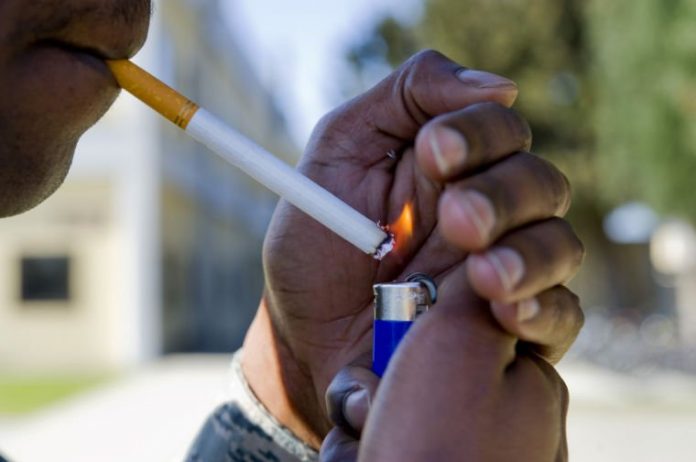City Council is considering stepping up local enforcement of state law that prohibits the sale of tobacco to minors, but charging businesses an annual fee to fund sting operations to ensure compliance isn’t the way to do it, Mayor Don Gage asserted.
Gilroy recently accepted a $25,000 grant from the Santa Clara County Public Health Department with three conditions: the City take action to help reduce youth access to tobacco, curb the prevalence of second-hand smoke and increase the availability of healthy foods and beverages.
But at the June 16 council meeting, City Senior Planner Stan Ketchum presented a proposal to create a citywide ordinance that would charge tobacco retailers an annual fee. It was met with resistance from a majority of the council but saw support from Councilman Peter Arellano and representatives of local nonprofit organizations.
In 2012, council stomped out a similar proposed ordinance that would have required local tobacco retailers to obtain a license through the City and pay up to $450 annually. Gage noted in April that Santa Clara County officials urged Gilroy to revisit the topic.
The fee discussed at the meeting, proposed between $350 and $450, would specifically fund sting operations led by the Gilroy Police Department to see if local retailers sell age-restricted tobacco products to minors—and satisfy a condition of the grant. Currently, the GPD leads sting operations targeting sales of tobacco to minors roughly twice a year, according to Sgt. Pedro Espinoza.
“I really don’t see how charging Nob Hill Foods or Tony’s Cigar Shop $450 a year is going to do anything to curb tobacco use by kids,” Councilman Dion Bracco said. “That’s all it really is—a fee generator—and it just keeps coming back. I’m not for that.”
Morgan Hill implemented a similar ordinance this year and currently charges the tobacco retailers $145 annually to operate, according to Ketchum. If Gilroy approved its own version of the ordinance, the revenue would also fund expanded code enforcement activities from verifying retailers comply with state law on where tobacco-related advertisements are displayed to where the products are located.
Tobacco dealers across California must pay the Board of Equalization a one-time fee of $100 to sell commercially—and that license must be renewed each year.
Arellano, also a Kaiser Permanente physician, said charging business owners once to operate is simply not enough to remind them the deadly and addictive nature of the tobacco products on their shelves.
“To let the people who deal in an addictive drug just pay a one-time fee is, I think, criminal,” Arellano said. “They are selling something that is not good for the health of our children.”
Gilroy-based nonprofit Community Solutions CEO Erin O’Brien argued that it’s City Council’s moral responsibility to toughen enforcement.
“We’re talking about selling tobacco to kids, which is both illegal and immoral,” she said. The people who are selling this are doing it to make a profit. They are profiting by selling a legal, addictive product that is harmful to all of us as a society.”
At the meeting, O’Brien detailed her struggle to quit smoking. On Dec. 27, she quit but recently started back up again, saying, “It’s the worst thing I’ve ever dealt with in my life.”
“I was 16 when I started smoking, and I bought cigarettes myself,” O’Brien added. “If I hadn’t been able to buy it as a kid, who knows, it might have been different. It’s embarrassing to say I’m an addict to it; it’s a horrible nasty habit. For us to put some teeth into this is, frankly, our responsibility. “
But instead of passing on additional costs to local retailers—noting that a majority of roughly 57 tobacco dealers citywide are convenience stores—Gage suggested adding strict penalties for those businesses who repeatedly sell to minors.
“I’m all in favor of pulling their licenses and not allowing them to sell if they’re caught selling to minors,” he added. “I’m not in favor of charging a fee every year just to be in business.”
Council ultimately requested the City Attorney’s Office investigate the legality of the concept.
Healthy foods and snacks at City events?
Along with the tobacco retail license, Council discussed recommendations by staff to require the City’s Recreation Department offer healthy food and snacks during summer and after-school programs and encourage Gilroy employees eat healthy foods.
The proposed regulations, still in the early stages of discussion, would prohibit tobacco retailers from opening within a 1,00-foot radius from schools, parks and playgrounds if adopted.
Bracco was outspoken in his opposition to the concept of policing what city employees and residents eat.
“It’s not my place to tell the employees here at City Hall they can’t have a soda or eat potato chips with their lunch. It’s none of my business,” Bracco said. “I’m not going to tell (Councilman Perry) Woodward what his kids can snack on at a city event. I see the county comes up with this stuff, and they push it on cities to agree with them.”
Ultimately, council voted 5-1—with Bracco as the lone dissenting vote—to prepare a work plan for the multi-pronged approach funded by the county. The item is expected to come up for discussion later this summer.














